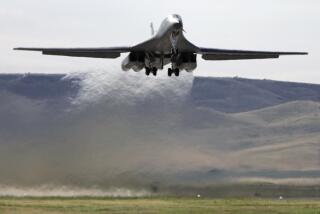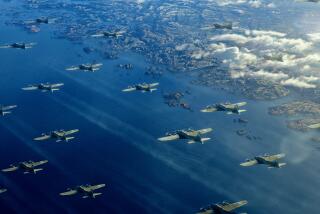B-17 Pilot’s Last Flight Is a Victory Over Guilt
For half a century, Bud Kingsbury carried the baggage with him--the nagging feeling that somehow he was responsible for the deaths of the nine crewmen in the B-17 bomber he was piloting in a World War II raid over Italy.
On Friday, the La Mirada man climbed into the sky and jettisoned the guilt for good.
The last survivor of a wartime bomber nicknamed “Big Jeff” took the controls of one of the last surviving B-17s and piloted it over the Southern California coastline.
Clutching the controls to guide the old war bird, Kingsbury, now 73, was able to let loose of feelings that have haunted him since Aug. 19, 1943--the last time he flew a Flying Fortress.
That was the day his lumbering, 30-ton aircraft was riddled by machine gun fire from German Messerschmit fighters. One wing was nearly blown off. Two of the plane’s four engines were on fire. Five crew members lay dead or dying in the back.
Crippled and falling from the sky, the “Big Jeff” was surrounded by enemy attackers. Kingsbury, 22, gave the order to bail out. The four crew members in the front of plane struggled into their parachutes and jumped 19,000 feet over the ocean.
“I knew the bombardier and the navigator couldn’t swim. My engineer was a big strong guy, but he didn’t know celestial navigation and wouldn’t know which way to swim at night,” Kingsbury said. The co-pilot apparently floated his parachute toward the sea, instead of directing it toward land.
It took Kingsbury 32 hours to swim 21 miles through shark-infested waters to the Italian shore. There, he was captured and held for 22 months as a POW.
“The crew was like a family,” Kingsbury said Friday as he waited to climb into the B-17 parked at the Palomar Airport in Carlsbad. In his hand was a framed photograph of the men of the “Big Jeff” posing with Kingsbury’s pet dog, named Little Jeff.
“I’ve had a lot of problems being the sole survivor. I’ve wondered if I did the right thing. What could I have done? I spent a lot of sleepless nights. Nobody knew about it except my wife, Kay. I finally went to a psychiatrist over it.” Kingsbury’s buddies at a South Gate B-17 veterans groups arranged Friday’s odyssey.
Soon it was time to take off. Kingsbury climbed into the back of olive-drab bomber, squeezed past the waist guns and made his way across a narrow bridge over the bomb bay to its cramped cockpit.
It was a dead ringer for “Big Jeff,” Kingsbury decided. Restored at a cost of $675,000, the old B-17 is flown across the country each year by a nonprofit historical group, the Collings Foundation of Stow, Mass. It will fly with a B-24 in and out of Orange County, Torrance, Camarillo, Riverside and Pomona airports during the next week, and $7 public tours will be offered.
The B-17 lifted off and turned lazily over the coast. Collings Foundation pilot Ted Stewart turned over the controls as the bomber reached the ocean. “Level off at 2,500 and make a 360 to the left,” he told Kingsbury.
The retired plumbing contractor complied. The noise from the plane’s four engines was drowned out by the roar of wind rushing through the openings for the B-17’s waist guns and the open hatch atop its 19-foot-high fuselage.
The turn was smooth. The smile was wide. “For a while there I had your lives in my hands,” Kingsbury said with a laugh after climbing out of the pilot’s seat.
For Kingsbury, the flight ended too soon at Orange County’s John Wayne Airport. As the bomber taxied to a stop, he gazed around the cockpit one last time. He was glad to be climbing out of the plane, not bailing out.
“The old sounds and smells are here,” he said. “This has brought a lot of memories back.”
This time they were different memories, though. There was no longer any doubt for Kingsbury.
The plane’s cramped interior made it clear that he could not have helped the men in the back. And its controls affirmed that there was no way to fly the “Big Jeff” to safety.
“It’s still a sluggish old thing,” Kingsbury said. “I thought I’d never have a chance to fly one again.
“I was remembering all the good times I had with the crew. I was in heaven.”
More to Read
Sign up for Essential California
The most important California stories and recommendations in your inbox every morning.
You may occasionally receive promotional content from the Los Angeles Times.











